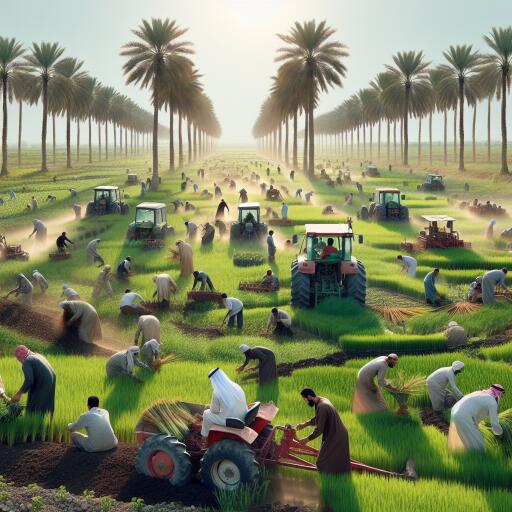
Transformative Agricultural Project in Ninawa | Iraq Business News
In an ambitious move toward sustainable agriculture, a groundbreaking initiative in Ninawa governorate, Iraq, aims to revolutionize farming practices amidst the challenging backdrop of climatic adversities. Spearheaded by the World Food Programme (WFP) in collaboration with local partners, this initiative stands as a beacon of hope for small-holder farmers grappling with the escalating threats posed by the climate crisis.
Ninawa, historically celebrated as Iraq’s “breadbasket”, is at a crossroads, confronting severe droughts, water scarcities, and the aftermath of conflict. These challenges have significantly dented the agricultural landscape, putting food security and livelihoods at risk. However, in the face of adversity, the WFP’s multi-year initiative is pioneering a shift towards conservation agriculture, striving to usher in a new era of resilience and sustainability for the region’s farming communities.
A Focus on Conservation Agriculture and Water Management
Central to this transformative project is the training of over 500 farmers in advanced agricultural practices, including conservation agriculture, savvy water management techniques, and modern irrigation technologies. This comprehensive education program is designed to empower farmers with the skills needed to mitigate the adverse impacts of climate change on agricultural production.
Conservation agriculture stands at the heart of the initiative’s strategy. This approach emphasizes minimal soil disturbance (no-till farming), the maintenance of soil cover, and crop rotation. The objective is to bolster soil health, enhance water retention, and reduce the need for chemical fertilizers, thus achieving significant labor and cost savings for the farming community. Moreover, it contributes to tackling the critical issue of water scarcity, particularly in arid regions like Ninawa.
The initiative goes further, promoting biodiversity and ecological resilience by educating farmers on soil conservation techniques, the use of native seeds, and the integration of drought-resistant plant species into their cropping systems. Through such measures, the project not only addresses immediate food security concerns but also lays the groundwork for sustainable agricultural practices that can endure the vicissitudes of climate variability.
Supporting Infrastructure and Knowledge Transfer
To ensure the success of these transformative practices, the project has facilitated the provision of essential agricultural inputs and assets. Notable contributions include no-till seeders, tractors, and storage facilities, all aimed at enhancing the operational capacity of farmers. These resources, donated to the University of Mosul and the Directorate of Agriculture, signify a tangible investment in the region’s agricultural infrastructure and knowledge base.
A Collaborative Effort towards a Sustainable Future
WFP’s endeavors in Ninawa are part of a broader collaboration with the Government of Iraq and various partners, focusing on combatting the root causes of climate change while adapting national policy to support vulnerable communities. Backed by generous funding from the Federal Ministry for Economic Cooperation and Development (BMZ), this initiative is a crucial step forward in addressing food security and advancing sustainable food systems within Iraq.
The project’s holistic approach, which marries advanced agricultural techniques with a commitment to sustainability and resilience, is a potent model for future efforts to tackle the intertwining challenges of climate change, food security, and economic development. As the initiative progresses, it promises not only to transform the landscape of Ninawa but also to serve as a template for sustainable agriculture practices beyond Iraq’s borders, ensuring a healthier planet for future generations.
By focusing on equipping farmers with the knowledge and tools for smarter, more sustainable farming practices, the project stands as a testament to the power of collaborative innovation in the face of environmental adversity. It’s a bold step towards a future where humanity and nature thrive in harmony, rooted in the fertile grounds of Ninawa.





Leave a Reply